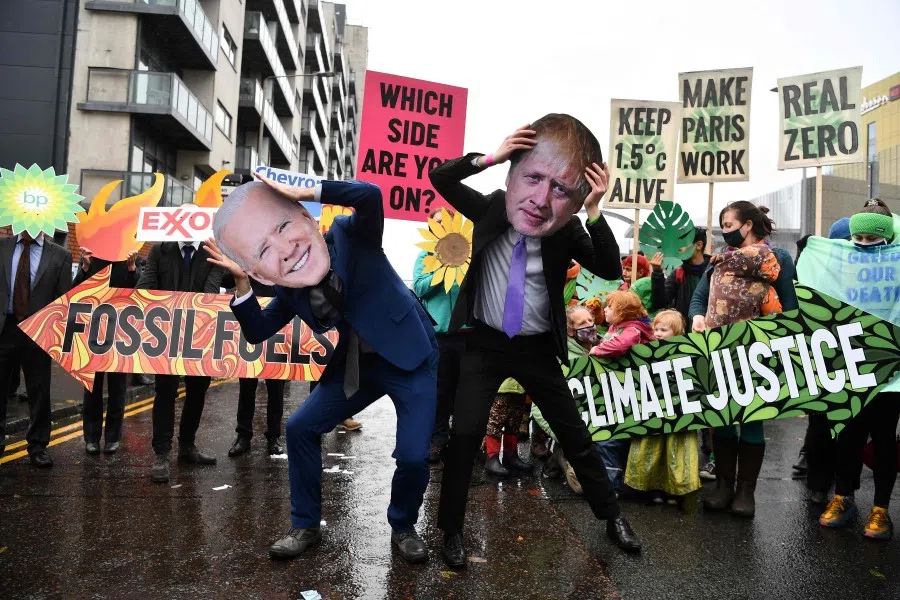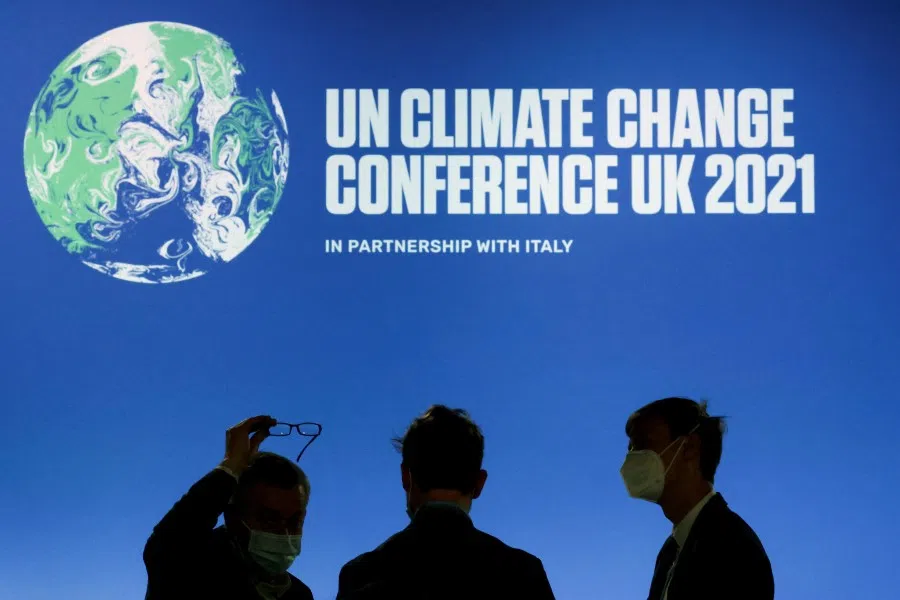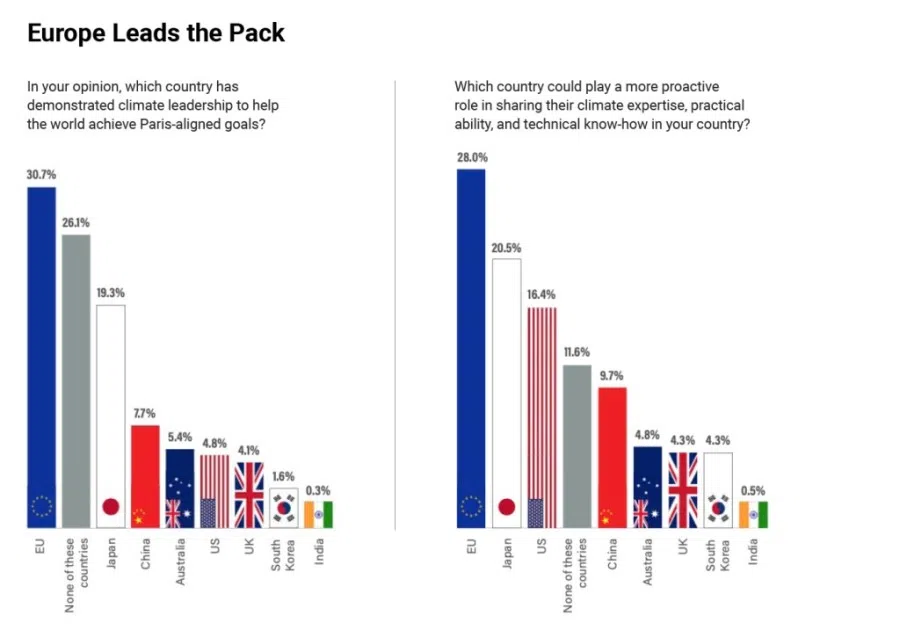US and China not perceived as climate change leaders in Southeast Asia
Although geopolitics is encroaching onto climate change discussions, a poll shows that Southeast Asians remain objective and pragmatic. Achieving climate goals in the region depends on realpolitik and ASEAN leaders' shrewdness in tapping resources from all major powers.

Geopolitics will inevitably turn up the heat (pun intended) on climate change. As the two major powers, the US and China, clash incessantly over trade, technology and security, it is indeed tempting to analyse whether the management of climate change will become another contested path to global supremacy. Would the US show strong leadership and win allies' trust in this global conundrum? Or will China dominate the global supply chain and investments in green transformation?
The quick answer to these questions is that the role of the two major powers in fighting climate change is overrated. Often regarded as one of the most vulnerable regions to climate change and a theatre of US-China rivalry, Southeast Asians' views towards the two major powers' race to climate supremacy offer a reality check.
A recent poll conducted by the ISEAS - Yusof Ishak Institute on climate change shows that neither the US nor China are perceived as the climate leaders that will help the world achieve goals as laid down by the 2015 Paris agreement.
Instead, 30.7% of 610 Southeast Asians surveyed think that the European Union (EU) has demonstrated climate leadership. An almost equal proportion of the respondents (26.1%) cannot attribute a global climate leadership role to a single country, revealing a group of sceptics who remain cynical about major powers' climate leadership. Meanwhile, Japan (19.3%) is the second front-runner in demonstrating climate leadership for the region.

The respondents have cottoned on to something. After all, the US and China's rhetoric and policies since 2015 leave much to be desired.
During the administration of US President Donald Trump, the US abandoned global cooperation on climate change and initiated significant rollbacks on domestic climate policies such as the dismantling of the Environmental Protection Advisory Boards and restrictions on the circulation of scientific data on climate.
...while 44 countries at the ongoing COP26 talks in Glasgow have pledged to quit coal, three of the biggest coal consumers and carbon emitters of the world - the US, India and China -have decided to sit out.
Although President Xi frequently stated that China would play a proactive role in global climate leadership, China continued its heavy investments in coal plants in the region (until it pledged, more recently, to stop building overseas coal plants in its 14th FIve-Year Plan). It was only in September 2021 that China finally announced its pledge to achieve carbon neutrality by 2060.
That said, while 44 countries at the ongoing COP26 talks in Glasgow have pledged to quit coal, three of the biggest coal consumers and carbon emitters of the world - the US, India and China -have decided to sit out. In yet another joint initiative spearheaded by the US and the EU to cut global methane emissions, China and India are again conspicuously absent.

The fact that Southeast Asians look to the EU as a climate change leader is not surprising. The EU is the most serious and disciplined in pursuing climate goals. In 2019, for instance, the regional bloc successfully slashed carbon emissions by 24% compared to 1990 levels.
The EU is even more ambitious by announcing a reduction of another 31% in carbon emissions by 2030 and net-zero by 2050, making it the first carbon-neutral continent. Brussels has also approved the European Climate Law, which outlines tougher and legally binding regulations for drastic carbon emissions cuts, making it the only advanced economy that does so.
The EU Green Deal is estimated to cost €1 trillion, half of which will come directly from the EU budget and the EU Emissions Trading Scheme and the other half from public and private co-financing. It aims to provide green jobs while putting the economy on a sustainable path. But in doing all this, the EU acknowledges that global partnership is absolutely essential, or its efforts will be futile.
Respondents in the survey also feel that the EU is the most trusted partner in sharing climate expertise, practical capabilities, and technical know-how with their country.
Yet surprisingly, despite the absence of American climate leadership, the perception of Washington's ability to do more in the region has risen more than three-fold to 16.4%.
Japan is selected as a close second and the top choice in countries like Brunei, Cambodia, Laos, and the Philippines. The preference for Japan could be due to the high trust created by its international development agencies, which have been deeply involved in the region's economic and social growth over the past five decades.
Both Japan and Japanese businesses based in Southeast Asia have increasingly paid more attention to the region's clean energy transition. This led to an announcement of the Asia Energy Transition Initiative to help countries to draw up roadmaps for energy transition and a US$10 billion pledge in financial support, technology development and deployment and capacity-building - all of which are sorely needed in this region.
Yet surprisingly, despite the absence of American climate leadership, the perception of Washington's ability to do more in the region has risen more than threefold to 16.4%. This shows a residual reservoir of hope that the US will take greater climate action, perhaps in large part due to the Biden Administration's public focus on climate change.

The survey findings indicate that Southeast Asians are highly objective and pragmatic in evaluating major powers' climate leadership abilities. More importantly, there is no tendency to frame the climate conundrum as a geopolitical battle between the US and China. Rather, the focus is on what external powers can realistically do to help the region.
Southeast Asian leaders are likely to stay opportunistic and shrewdly tap available resources from all major powers to help them decarbonise.
Southeast Asian countries have frequently relied on the principle of Common but Differentiated Responsibility in climate negotiations. Under this principle, they insist that developed countries recognise the different capabilities and responsibilities of individual countries in addressing climate change. Many Southeast Asian countries also highlighted the need for international assistance to fulfil their conditional targets in their nationally determined contributions (NDCs) under the Paris Agreement.
Southeast Asian leaders are likely to stay opportunistic and shrewdly tap available resources from all major powers to help them decarbonise. Southeast Asian governments are unlikely to be constrained by any false binary choices but will most likely assess partnerships based on political will, capacity and capability.
As one commentary suggests, realpolitik may well push Asia to be more financially interconnected and dependent on China in its decarbonisation mission. The problem here, however, is that China does not possess the political will to do so as yet.
As cliché as it sounds, climate change is a race that the world should win. And until climate change ambitions are ratcheted up, talk about China and the US's respective roles is grossly exaggerated.
This article was first published by ISEAS - Yusof Ishak Institute as a Fulcrum commentary.






